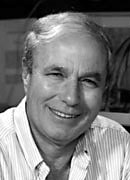 |
 |
|
 |
 |
 |
 |
 |
|
 |
 |
 |
 |

|
| |
 
Volume 11, No. 1, Spring/Winter 01 | Return to Table of Contents

MBL Investigator Wins Albert Lasker Award for Basic Medical Research
 The Albert and Mary Lasker Foundation announced recently that Avram Hershko, a summer researcher at the Marine Biological Laboratory had been awarded the prestigious Albert Lasker Award for Basic Medical Research. Dr. Hershko, a professor of biochemistry at the Technion-Israel Institute of Technology in Haifa, Israel, shares the award with Aaron Ciechanover also of the Technion and Alexander Varshavsky of the California Institute of Technology. The Albert and Mary Lasker Foundation announced recently that Avram Hershko, a summer researcher at the Marine Biological Laboratory had been awarded the prestigious Albert Lasker Award for Basic Medical Research. Dr. Hershko, a professor of biochemistry at the Technion-Israel Institute of Technology in Haifa, Israel, shares the award with Aaron Ciechanover also of the Technion and Alexander Varshavsky of the California Institute of Technology.
They received the award in recognition of their “discovery and the recognition of the broad significance of the ubiquitin system of regulated protein degradation, a fundamental process that influences vital cellular events, including the cell cycle, malignant transformation, and responses to inflammation and immunity.”
Ubiquitin is a protein found within cells that targets other proteins for elimination. Scientists have long known that all cells manufacture and subsequently discard an array of proteins involved in a variety of cellular processes. Although many scientists over the years have focused their research on learning more about how cells make proteins, until recently few have explored how cells go about discarding proteins, and the impact that process has on disease.
Twenty-five years ago, Avram Hershko took a road less traveled in science and began studying how cells rid themselves of unwanted or damaged proteins. With the help of his colleagues, Hershko discovered the ubiquitin system and eventually determined that it impacts major physiological processes in the body. Scientists now know that it is involved in regulating cell division, aids in controlling embryonic development, and helps maintain the immune system. It is implicated in a number of diseases as well, including cervical cancer caused by the human papilloma virus. Because it is involved in the body’s inflammatory response to invading microbes, it may also play a role in autoimmune diseases.
Hershko has been a summer investigator at the Marine Biological Laboratory for the past 10 summers. He was drawn to the MBL when he became interested in learning more about the role that ubiquitin plays in the cell division cycle.
“Many important regulators of the cell cycle are degraded in a programmed fashion, which allows the cell cycle to progress,” explains Hershko. The first of these proteins, known as cyclin B, was discovered by Tim Hunt, Joan Ruderman, and their colleagues working independently at the MBL in the early 1980s. By 1989, MBL scientists had developed a means of studying cyclins and the cell cycle in the test tube using the eggs of local surf clams as models. It turned out to be exactly the system that Hershko needed to study what role, if any, ubiquitin played in the process. In collaboration with Robert Palazzo, now at the University of Kansas, Hershko determined that cyclin is degraded by the ubiquitin system during the cell cycle. Working with Joan Ruderman of Harvard University, he later identified a specific ubiquitin ligating complex that “targets cyclin B for degradation at the end of mitosis”—the final phase of cell division.
Today Hershko is studying that ubiquitin ligating complex in both clam eggs and cultured human cells in hopes of learning even more about cell division in general and cancer more specifically.
“Changes in the mechanisms that control the activity of this complex lead to chromosome instability, and ultimately to cancer,” Hershko says. “Thus, work done at the MBL on the mechanisms of cell division in clam eggs may provide novel insights into their aberration in human cancer.”  |
|
 |
 |
|